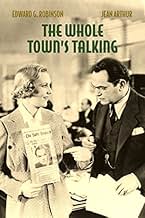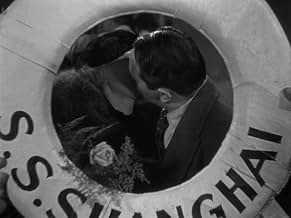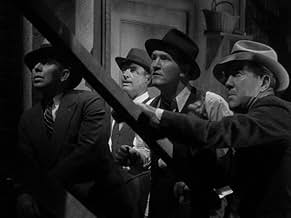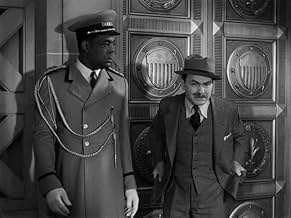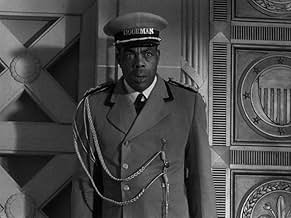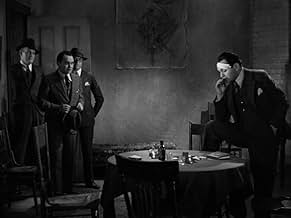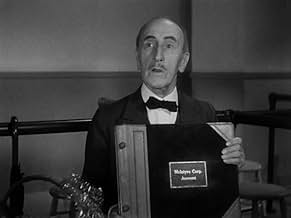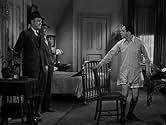AVALIAÇÃO DA IMDb
7,2/10
3,6 mil
SUA AVALIAÇÃO
Adicionar um enredo no seu idiomaA meek milquetoast clerk is mistaken for public enemy N° 1, and the notorious killer takes advantage of the situation.A meek milquetoast clerk is mistaken for public enemy N° 1, and the notorious killer takes advantage of the situation.A meek milquetoast clerk is mistaken for public enemy N° 1, and the notorious killer takes advantage of the situation.
- Direção
- Roteiristas
- Artistas
Harry Abrahams
- Convict
- (não creditado)
Ernie Adams
- Reporter
- (não creditado)
Carmen Andre
- Clerk
- (não creditado)
Chester A. Bachman
- Policeman
- (não creditado)
Eddie Baker
- Policeman
- (não creditado)
Lucille Ball
- Bank Employee
- (não creditado)
H. Barnum
- Undetermined Secondary Role
- (não creditado)
George Barton
- Policeman
- (não creditado)
- Direção
- Roteiristas
- Elenco e equipe completos
- Produção, bilheteria e muito mais no IMDbPro
Avaliações em destaque
Highly enjoyable comedy about meek clerk Arthur Jones (Edward G. Robinson) who is a dead ringer for the most wanted criminal in the country, "Killer" Mannion. Robinson is wonderful in both roles. No matter how many gangster roles he played, he always managed to add something unique to each one. It may just be a mannerism or personality trait, but I feel he managed to distinguish his characters in so many similar movies more than Bogart or Cagney did. Jean Arthur is hilarious and likable as the street smart girl Jones is in love with. Donald Meek is great fun as a busybody who refuses to believe Jones isn't Mannion. It's a rare comedy from director John Ford but a good one.
I saw this movie a long time ago as a teenager during a Edward G. Robinson retrospective. It was the one that stuck in my mind, and I never forgot it. Now I have it on videotape and watch it regularly, it stands multiple viewing very well.
The Whole Town's Talking is one of those perfect little movies. Everything falls into place the acting, the pace, the timing of the jokes, the dialog. Even the set design is fabulous, it was basically the big, bright office space in which the good guy Robinson plays slaves" that was unforgettable to me. The movie boasts an assortment of caricature like characters like no other movie I know, beside Robinson I would like to mention Jean Arthur, of course, and the two funny little guys, Donald Meek and, even more memorable, Etienne Girardot as the pedantic office overseer who urges Robinson to get on with the Macintyre account.
In its social comment The Whole Town's Talking reminds me of the work of Preston Sturgess. Mentionable are the media hype about a famous gangster which is really over the top (it's up there with His Girl Friday in this aspect) and the incompetence of the police force which is unable to deal with the gangster and even less with the media and is presented as a helpless and clueless organization. So the movie still has some actuality.
Movie buffs who look at John Ford as an auteur" may be disappointed. The Whole Town's Talking is very much a product of the studio system. But it amply shows what great things that system was able to accomplish at times!
The Whole Town's Talking is one of those perfect little movies. Everything falls into place the acting, the pace, the timing of the jokes, the dialog. Even the set design is fabulous, it was basically the big, bright office space in which the good guy Robinson plays slaves" that was unforgettable to me. The movie boasts an assortment of caricature like characters like no other movie I know, beside Robinson I would like to mention Jean Arthur, of course, and the two funny little guys, Donald Meek and, even more memorable, Etienne Girardot as the pedantic office overseer who urges Robinson to get on with the Macintyre account.
In its social comment The Whole Town's Talking reminds me of the work of Preston Sturgess. Mentionable are the media hype about a famous gangster which is really over the top (it's up there with His Girl Friday in this aspect) and the incompetence of the police force which is unable to deal with the gangster and even less with the media and is presented as a helpless and clueless organization. So the movie still has some actuality.
Movie buffs who look at John Ford as an auteur" may be disappointed. The Whole Town's Talking is very much a product of the studio system. But it amply shows what great things that system was able to accomplish at times!
Edward G. Robinson stars in "The Whole Town's Talking" along with Jean Arthur, Wallace Ford, and Donald Meek.
Edward G. Robinson was such a wonderful actor, a little guy with a towering talent. Here he has a dual role - that of an escaped criminal, Mad Dog Mannion and that of Arthur Jones, clerical worker, a shy man with a crush on a coworker (Arthur). When Mannion escapes from prison, his face is on the front page, and he looks so much like Jones that someone who sees him in a restaurant turns him into the police. When fingerprint ID verifies that he is not Mannion, he's given a letter by the police chief stating that he's not Mannion and should be left alone and even gets a job writing for the local newspaper about his experiences being mistaken for Mannion.
Unfortunately for poor Arthur, Mannion shows up and wants to use the pass, which he does, raising complete havoc. He also starts giving Arthur info for the news stories - and the police wonder how it is Arthur knows so much.
One of the funniest parts of the film for me was the newspaper description of Mannion - a cruel mouth, a Neandrathal face, etc., and poor Jones looking at himself in the restaurant mirror trying to look evil.
Robinson is fabulous - so sweet, so gentle, such a hard worker as Arthur and a ruthless killer as Mannion. Jean Arthur, as the outspoken Miss Clark is great - when she's questioned by the police, they assume she's Mannion's accomplice, so they keep asking her questions - who did this, who robbed that, and she keeps saying, using a tough, gun moll voice, "MANNION!" Then they find out it's not Mannion they caught after all.
I thought the movie went on just a tad too long, but otherwise, it was quite good, with fun performances, well directed by a man known for his westerns and bigger films, John Ford.
Edward G. Robinson was such a wonderful actor, a little guy with a towering talent. Here he has a dual role - that of an escaped criminal, Mad Dog Mannion and that of Arthur Jones, clerical worker, a shy man with a crush on a coworker (Arthur). When Mannion escapes from prison, his face is on the front page, and he looks so much like Jones that someone who sees him in a restaurant turns him into the police. When fingerprint ID verifies that he is not Mannion, he's given a letter by the police chief stating that he's not Mannion and should be left alone and even gets a job writing for the local newspaper about his experiences being mistaken for Mannion.
Unfortunately for poor Arthur, Mannion shows up and wants to use the pass, which he does, raising complete havoc. He also starts giving Arthur info for the news stories - and the police wonder how it is Arthur knows so much.
One of the funniest parts of the film for me was the newspaper description of Mannion - a cruel mouth, a Neandrathal face, etc., and poor Jones looking at himself in the restaurant mirror trying to look evil.
Robinson is fabulous - so sweet, so gentle, such a hard worker as Arthur and a ruthless killer as Mannion. Jean Arthur, as the outspoken Miss Clark is great - when she's questioned by the police, they assume she's Mannion's accomplice, so they keep asking her questions - who did this, who robbed that, and she keeps saying, using a tough, gun moll voice, "MANNION!" Then they find out it's not Mannion they caught after all.
I thought the movie went on just a tad too long, but otherwise, it was quite good, with fun performances, well directed by a man known for his westerns and bigger films, John Ford.
Whole Town's Talking, The (1935)
*** (out of 4)
A timid, shy and all around weak store clerk (Edward G. Robinson) gets mistaken for a harden gangster (Robinson) but his new fame allows him to store writing a column in a newspaper about how gangster are weak without their guns. Soon the gangster shows up wanting more than just a little help. As a comedy this movie is a real masterpiece but as a drama, the final thirty-minutes or so really bring down a lot of the great moments. While watching this Columbia movie you can't help but wonder if this was originally meant to be directed by Frank Capra as it has his screenwriters and the small town story certainly seems like something you'd get from a Capra and not someone like Ford. To his credit, Ford does a great job with the comedy and really delivers one of the funniest movies of the 1930's. The problem happens in the third act when it really turns to too much of a gangster film and the laughs are pretty much forgotten. What holds both sides together is the terrific performance by Robinson. The way he plays the timid clerk is just downright hilarious and this includes a masterfully acted interrogation sequence where Robinson is nearly brought to tears because he's so scared. Seeing a tough guy like Robinson acting scared was just hilarious and one actually starts to feel sorry for the guy because it appears he's about to die. Robinson is also great in his second role as the gangster as he's as tough as ever and does manage to come off quite demanding and threatening. Jean Arthur is wonderful as well and adds many great comic scenes including her own interrogation where she keeps admitting to crimes that she has nothing to do with or even knows about. Arthur Hohl, Arthur Byron, Wallace Ford and Donald Meek round out the supporting cast. You can even see Joe Sawyer playing one of Robinson's goons. Again, I didn't care for the final act of the film as the comedy starts to not happen but that doesn't take away from everything at the start of the movie. Robinson has never gotten the credit he deserves as an actual actor, which is a real shame but this film allows for both sides of him to be highlighted and to great effect.
*** (out of 4)
A timid, shy and all around weak store clerk (Edward G. Robinson) gets mistaken for a harden gangster (Robinson) but his new fame allows him to store writing a column in a newspaper about how gangster are weak without their guns. Soon the gangster shows up wanting more than just a little help. As a comedy this movie is a real masterpiece but as a drama, the final thirty-minutes or so really bring down a lot of the great moments. While watching this Columbia movie you can't help but wonder if this was originally meant to be directed by Frank Capra as it has his screenwriters and the small town story certainly seems like something you'd get from a Capra and not someone like Ford. To his credit, Ford does a great job with the comedy and really delivers one of the funniest movies of the 1930's. The problem happens in the third act when it really turns to too much of a gangster film and the laughs are pretty much forgotten. What holds both sides together is the terrific performance by Robinson. The way he plays the timid clerk is just downright hilarious and this includes a masterfully acted interrogation sequence where Robinson is nearly brought to tears because he's so scared. Seeing a tough guy like Robinson acting scared was just hilarious and one actually starts to feel sorry for the guy because it appears he's about to die. Robinson is also great in his second role as the gangster as he's as tough as ever and does manage to come off quite demanding and threatening. Jean Arthur is wonderful as well and adds many great comic scenes including her own interrogation where she keeps admitting to crimes that she has nothing to do with or even knows about. Arthur Hohl, Arthur Byron, Wallace Ford and Donald Meek round out the supporting cast. You can even see Joe Sawyer playing one of Robinson's goons. Again, I didn't care for the final act of the film as the comedy starts to not happen but that doesn't take away from everything at the start of the movie. Robinson has never gotten the credit he deserves as an actual actor, which is a real shame but this film allows for both sides of him to be highlighted and to great effect.
I don't think there's anyone who's ever seen The Whole Town's Talking and doesn't believe this was a film intended for Frank Capra. The mere fact that the screenplay was co-written by Robert Riskin who won an Oscar together with Capra for It Happened One Night the year before should give ample indication. If Capra had a choice between this and Broadway Bill he chose wrong.
Although this kind of comedy is not usually what is found in John Ford films, Ford does OK by it. I don't think he ever directed again anything that could be remotely classified as screwball comedy.
Edward G. Robinson who would make his second and last appearance in a Ford film 34 years later in Cheyenne Autumn, plays a dual role. He plays Killer Mannion in the tradition he established as Little Caesar and also A.L. Jones a meek, mild mannered clerk a type Robinson would play later in Mr. Winkle Goes to War.
Mannion's escaped from prison and there's a manhunt on for him, similar to the kind that was on for John Dillinger a year earlier. The police will simply shoot to kill. Bad luck for a guy that looks like Mannion and worse luck when Mannion finds out about his doppleganger and tries to make use of him.
Robinson is fine in his dual performance, but the film was a milestone for Jean Arthur who plays Robinson's fellow employee and despite his being a milquetoast, she sees something in him. Up to this point Arthur had played a lot of ingénues and loyal wives to leading men. This is her first role in a screwball type comedy that she became known for, in fact what she's remembered for mostly. Of course a year later, Harry Cohn did team her with Frank Capra and they certainly made some cinematic history.
My favorite two supporting parts are Etienne Girardot as Robinson's officious little office manager and Donald Meek another milquetoast who originally mistakenly turns in the clerk as the gangster and stays on the 'case.'
Though he's not in his element John Ford serves a nice piece of entertainment.
Although this kind of comedy is not usually what is found in John Ford films, Ford does OK by it. I don't think he ever directed again anything that could be remotely classified as screwball comedy.
Edward G. Robinson who would make his second and last appearance in a Ford film 34 years later in Cheyenne Autumn, plays a dual role. He plays Killer Mannion in the tradition he established as Little Caesar and also A.L. Jones a meek, mild mannered clerk a type Robinson would play later in Mr. Winkle Goes to War.
Mannion's escaped from prison and there's a manhunt on for him, similar to the kind that was on for John Dillinger a year earlier. The police will simply shoot to kill. Bad luck for a guy that looks like Mannion and worse luck when Mannion finds out about his doppleganger and tries to make use of him.
Robinson is fine in his dual performance, but the film was a milestone for Jean Arthur who plays Robinson's fellow employee and despite his being a milquetoast, she sees something in him. Up to this point Arthur had played a lot of ingénues and loyal wives to leading men. This is her first role in a screwball type comedy that she became known for, in fact what she's remembered for mostly. Of course a year later, Harry Cohn did team her with Frank Capra and they certainly made some cinematic history.
My favorite two supporting parts are Etienne Girardot as Robinson's officious little office manager and Donald Meek another milquetoast who originally mistakenly turns in the clerk as the gangster and stays on the 'case.'
Though he's not in his element John Ford serves a nice piece of entertainment.
Você sabia?
- CuriosidadesThe $250.00 per week that Jones is to get for writing the article in this 1935 comedy translates to $4,999.23 per week in 2019 dollars.
- Erros de gravaçãoWhen Jonesy leaves his apartment in a rush he forgets to turn off the taps and his tub is (torrentially) overflowing. But when he returns from the police much later in the day there is no water anywhere.
- Citações
Arthur Ferguson Jones: You know something, a woman is only a woman, but a good cigar is a smoke.
- ConexõesEdited into Michael Jackson: This Is It (2009)
Principais escolhas
Faça login para avaliar e ver a lista de recomendações personalizadas
- How long is The Whole Town's Talking?Fornecido pela Alexa
Detalhes
- Data de lançamento
- País de origem
- Idioma
- Também conhecido como
- The Whole Town's Talking
- Locações de filme
- Empresa de produção
- Consulte mais créditos da empresa na IMDbPro
- Tempo de duração1 hora 33 minutos
- Cor
- Proporção
- 1.37 : 1
Contribua para esta página
Sugerir uma alteração ou adicionar conteúdo ausente

Principal brecha
By what name was O Homem que Nunca Pecou (1935) officially released in India in English?
Responda

